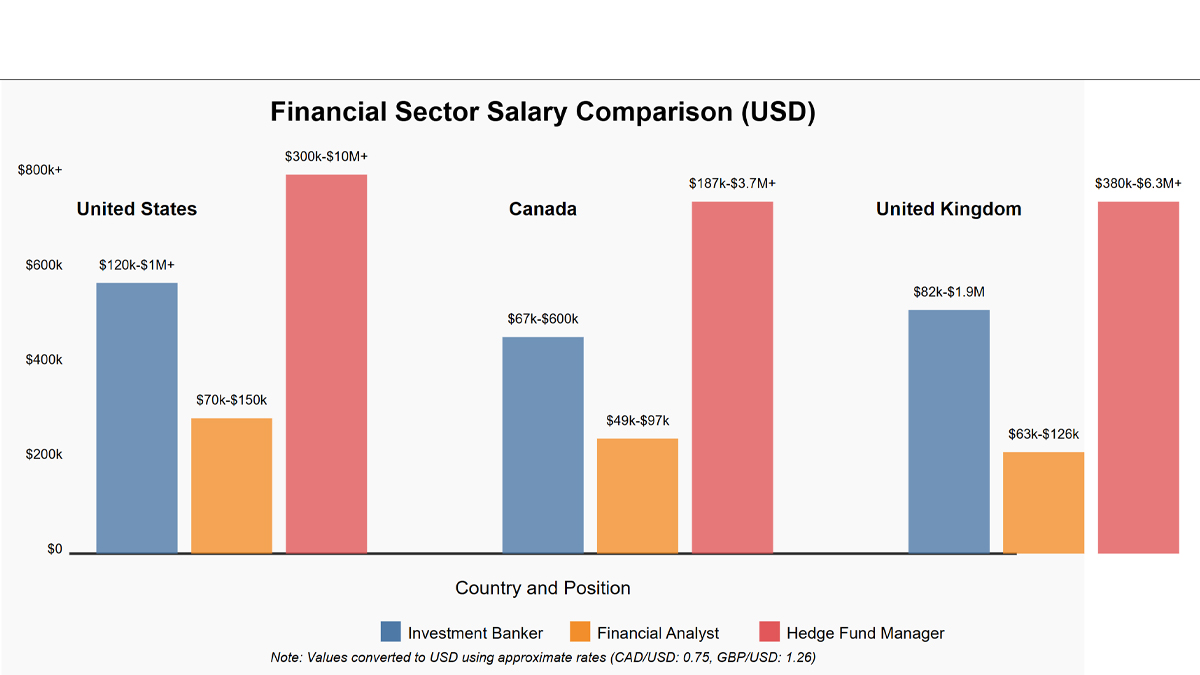What do finance jobs pay? Finance careers are known for being among the most lucrative, offering competitive salaries and excellent opportunities for growth. However, salaries in finance can vary significantly depending on factors such as role, location, experience, and industry sector.
Whether you’re exploring entry-level positions or aiming for senior roles, understanding these variables is key to maximizing your earning potential in the finance industry.
This guide breaks down finance salaries across key markets, including the US, Canada, UK, Germany, France, Australia, Switzerland, Sweden, Norway, and UAE.
What Do Finance Jobs Pay in Investment Banking? Salary Breakdown and Expectations
Investment bankers are among the highest-paid professionals in the finance sector, thanks to the demanding and highly competitive nature of the profession. This often leads many to ask, “What do finance jobs pay?” when considering roles in this field.
Compensation typically includes a base salary, performance bonuses, profit-sharing, and often stock options. This compensation structure reflects the high responsibility, long working hours, and specialized skills required in the role.
To give a clearer picture of the financial potential at each level, here are the average annual salary ranges for key positions:
Entry-level (Analyst): $85,000 – $120,000 per year. This amount can vary depending on location, with investment firms in global financial hubs like New York and London offering higher salary ranges. In addition to the base salary, analysts often receive substantial performance bonuses, which can frequently double their base salary.
Mid-level (Associate): $150,000 – $250,000 per year. Professionals at this level often manage smaller teams and make more impactful decisions within financial transactions. Performance bonuses, which are a significant part of the compensation, can account for a large portion of this total, along with other benefits such as profit-sharing.
Senior-level (VP & Managing Director): $300,000 – $1,000,000+ per year. Professionals in leadership positions like Vice Presidents (VPs) and Managing Directors are responsible for leading major transactions and strategic decisions. In addition to the base salary, stock options and long-term bonuses can significantly boost earnings, with top earners often receiving multimillion-dollar sums due to their direct impact on the company’s finances and operations.
Source: Wall Street Oasis, Glassdoor

Additional Tip: While the salaries are high, the competitive nature of investment banking demands refined technical skills, the ability to work under pressure, and the capacity to make quick, assertive decisions.
Strategies for Advancing in Investment Banking
For those aiming to reach the top in this career, understanding the dynamics of the financial market, the importance of networking, and how to optimize performance at different stages of your career are crucial aspects.
What Do Finance Jobs Pay for Financial Analysts? Trends and Salary Ranges
Financial analysts play a crucial role in evaluating market trends, financial data, and investment opportunities, providing insights that help businesses, investors, and organizations make informed financial decisions.
As many seek to understand what do finance jobs pay, it’s important to know that compensation for financial analysts varies significantly depending on their experience and industry.
This profession requires a solid understanding of financial modeling, data analysis, and economic indicators, making it a highly sought-after role in the financial sector. Compensation varies based on experience, location, and the specific industry in which the analyst works.
Here’s a breakdown of the typical salary ranges for financial analysts at different career stages:
Entry-level: $60,000 – $85,000 per year. At this stage, financial analysts are usually responsible for gathering and analyzing data, preparing reports, and supporting senior analysts. The salary can vary depending on the industry and location, with analysts in major financial hubs like New York and London often earning higher salaries. Additionally, the opportunity for bonuses and career growth is significant for those who perform well.
Mid-level: $90,000 – $120,000 per year. Professionals at this level typically have a few years of experience and are responsible for making more independent recommendations and providing deeper analysis. As their expertise grows, their salary increases, often accompanied by performance-based bonuses and opportunities for leadership roles in larger teams or projects.
Senior-level: $130,000 – $200,000 per year. Senior financial analysts often hold specialized roles, such as overseeing large financial portfolios, managing complex investment strategies, or providing advisory services to high-net-worth clients. Their compensation reflects their expertise, leadership, and the significant impact they have on their firm’s financial outcomes. Bonuses, stock options, and other incentives often make up a large portion of their total compensation.
Source: Bureau of Labor Statistics
Additional Insight: The role of a financial analyst can be highly dynamic, offering a clear path for advancement. As analysts gain experience and develop their technical and analytical skills, they often transition into more senior roles, such as portfolio managers or financial consultants.
High-Paying Sectors for Financial Analysts
Furthermore, financial analysts working in specific sectors, like investment banking or hedge funds, may earn significantly more due to the high stakes and demanding nature of these industries.
What Do Finance Jobs Pay for Hedge Fund Managers? Earnings and Compensation Insights
Hedge fund managers are among the highest-paid professionals in the financial sector, responsible for overseeing large investment portfolios and employing sophisticated strategies to generate high returns.
Their work involves analyzing market trends, making investment decisions, and managing risks to maximize profits for their investors. The compensation for hedge fund professionals is often performance-based, meaning that their earnings are directly tied to the success of the fund.
Here’s a breakdown of the salary ranges for various roles within hedge funds:
Junior Analyst: $90,000 – $150,000 per year. At this entry-level position, junior analysts support portfolio managers and hedge fund managers by conducting research, analyzing financial data, and helping to identify potential investment opportunities. While the base salary is competitive, performance bonuses and profit-sharing can significantly boost their total compensation, especially in high-performing funds.
Portfolio Manager: $300,000 – $2,000,000+ per year. Portfolio managers are responsible for making critical investment decisions and managing client funds. They often specialize in particular sectors or asset classes, such as equities, fixed income, or derivatives. In addition to a base salary, portfolio managers typically earn significant performance bonuses, which can sometimes exceed their salary, depending on the fund’s performance. The compensation for portfolio managers varies greatly depending on the size of the fund, the complexity of its strategies, and the risk involved.
Hedge Fund Partner: $1M – $10M+ per year. Partners in a hedge fund typically have a substantial equity stake in the fund, allowing them to earn a significant portion of the profits. In addition to a salary, their compensation is heavily performance-driven and can include profit-sharing, carried interest, and other incentives tied to the fund’s overall success. The earnings for hedge fund partners can vary greatly based on the size and performance of the fund, with top-performing funds delivering multimillion-dollar payouts to their partners.
Source: Institutional Investor, Forbes
What Do Finance Jobs Pay for Hedge Fund Managers? Earnings and Compensation Insights
Factors Affecting Hedge Fund Salaries & Earnings
The earnings of hedge fund professionals are highly dependent on the success of the fund and the individual’s role in its performance. The hedge fund industry is known for its high-risk, high-reward nature, and compensation reflects this dynamic.
Professionals in larger, more successful hedge funds often earn substantially more than their counterparts in smaller or underperforming funds. Additionally, hedge fund managers who work in major financial centers, such as New York or London, can expect higher salaries and bonuses compared to those in smaller markets.
What Do Finance Jobs Pay for Financial Advisors? Key Factors Influencing Compensation
Financial advisors play a crucial role in helping individuals, families, and businesses manage their wealth and plan for the future.
If you’re wondering what do finance jobs pay, it’s important to note that financial advisors’ salaries can vary greatly depending on the level of experience and specialization.
Their primary goal is to provide personalized financial advice based on a client’s financial goals, risk tolerance, and future plans. Compensation for financial advisors varies based on their experience, client base, and the services they offer.
Entry-level (Financial Advisor): $50,000 – $75,000 per year. At this stage, financial advisors often focus on building a client base, conducting financial assessments, and providing basic investment and retirement planning advice. While base salaries are competitive, many entry-level advisors also earn commissions or bonuses based on the performance of their clients’ investments.
Experienced Advisors: $100,000 – $250,000 per year. As financial advisors gain experience, they often expand their service offerings to include more complex financial planning such as tax strategies, estate planning, and investment management. Experienced advisors typically have a more established client base and may receive higher commissions, as well as performance-based bonuses.
Top Earners (Senior Financial Advisors): $500,000+ per year. The top earners in financial advising are often experts in specialized areas such as wealth management, tax planning, and estate planning. They usually manage high-net-worth clients and work for prestigious firms or as independent advisors. Compensation for senior advisors includes significant bonuses and commissions, in addition to a higher base salary.
Source: Financial Planning Association
What Do Finance Jobs Pay in Different Countries? Top Financial Salaries Around the World
The financial industry offers lucrative salaries worldwide, but compensation varies greatly by country due to factors such as local demand, cost of living, and economic conditions.
Let’s explore the salary ranges for key financial roles across different countries:
United States
- Investment Banker: $120,000 – $1M+
- Financial Analyst: $70,000 – $150,000
- Hedge Fund Manager: $300,000 – $10M+
Canada
- Investment Banker: CAD 90,000 – CAD 800,000
- Financial Analyst: CAD 65,000 – CAD 130,000
- Hedge Fund Manager: CAD 250,000 – CAD 5M+
United Kingdom
- Investment Banker: £65,000 – £1.5M
- Financial Analyst: £50,000 – £100,000
- Hedge Fund Manager: £300,000 – £5M+

Sources: Bloomberg
What Do Finance Jobs Pay? Key Factors Influencing Salaries in the Financial Sector
Several key factors contribute to the salary ranges in the finance industry. Understanding these factors can help aspiring professionals make informed decisions and maximize their earning potential.
So, what do finance jobs pay really depends on experience, location, and industry sector, which are discussed below.
Experience Level – Experience directly correlates with salary. As professionals advance in their careers, they often take on more responsibility and manage larger portfolios, which increases their earning potential.
Education & Certifications – Educational qualifications and certifications such as MBA, CFA (Chartered Financial Analyst), and CPA (Certified Public Accountant) are highly valued and can significantly increase salary prospects. In particular, CFA certifications can be crucial for roles in investment banking and hedge funds.
Industry & Sector – Certain areas within finance, such as investment banking and hedge fund management, offer significantly higher salaries compared to other sectors like corporate finance or insurance. The complexity and risk associated with these roles often translate into higher compensation.
Location – Finance hubs like New York, London, and Zurich offer higher salaries due to the concentration of major financial institutions and the higher cost of living. Professionals working in emerging financial markets or smaller cities may see lower compensation but can benefit from less competition and lower living costs.
Performance Bonuses – Many finance professionals, particularly in investment banking and hedge funds, earn a substantial portion of their salary through performance-based bonuses. These bonuses are tied to the success of the firm or individual performance, incentivizing high performance and rewarding top-tier results.
Final Thoughts: What Do Finance Jobs Pay and Career Outlook.
Finance offers highly competitive salaries, but it’s important to note that earnings depend on various factors including industry sector, experience level, and location.
So, if you’re still wondering, “What do finance jobs pay?”, remember that your salary potential is influenced by your chosen field, location, and experience.
While some roles, like hedge fund managers and investment bankers, can bring in multimillion-dollar salaries, they also come with high pressure and demand.
To maximize earning potential, investing in education, obtaining industry certifications, and gaining specialized expertise are essential steps.



